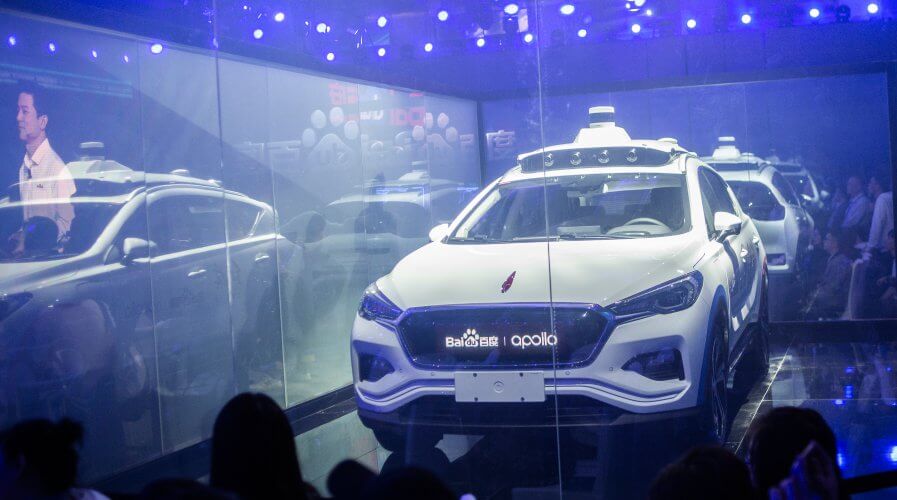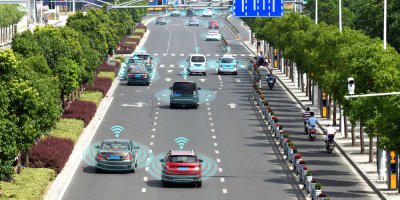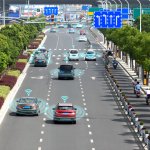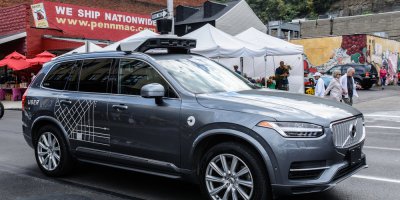
Baidu’s fleet of 300 level 4 vehicles across 13 cities in China have driven autonomously for a whopping 2 million kilometers in urban settings. Source: Shutterstock
What does the 1m miles milestone mean for Baidu’s autonomous cars?
CHINESE search engine giant Baidu seems to be on the path to delivering road-ready autonomous cars.
At a recent company conference in Beijing, it updated developers on all the exciting progress that its ever-expanding driverless vehicle ecosystem has made thus far.
Most impressive among the announcements was the fact that Baidu’s fleet of 300 SAE level-4 vehicles across 13 cities in China have driven autonomously for a whopping 2 million kilometers (approximately 1.2 million miles) in urban settings.
Level 4 autonomous vehicles are defined as systems that can operate safely without human oversight or intervention in select condition, by the Society of Automotive Engineers (SAE).
Meanwhile, the Beijing Municipal Commission of Transport awarded all of its first batch of T4 autonomous vehicles test permits to Baidu earlier this month. The T4 is China’s highest level permit, which is an open-road test license that will allow the company to trial its prototypes on urban roads, tunnels, and even in school areas.
Strategic partnerships spurring innovation
Beyond groundbreaking achievements of its own, Baidu has also been sealing strategic partnerships with other industry leaders to drive development and deployment innovative solutions further.
Among them include a tie-up with Geely where Baidu will be equipping the automaker AI-powered internet of vehicles (IoV) solutions featuring voice assistants, augmented reality, and motion sensor functions.
Baidu Co-founder, Chairman, and CEO Robin Li said that much of the progress within the field of mobility is owed to technological developments in the transportation industry.
“Geely’s long history of technological focus has fast-tracked the carmaker as an innovative force in China’s automotive industry and a trendsetter in the era of intelligent vehicles.
“Baidu and Geely’s strategic partnership will empower AI to create more spontaneous and convenient interactions between humans and vehicles. It will […] accelerate the intelligent transformation of the mobility industry, supporting China in its transformation to become a leader in the age of smart mobility,” said Li.
Other than Geely, Baidu has also partnered with Chinese state-owned car company FAW Group – makers of the country’s famed Hongqi line of luxury cars – as well as US car makers Ford to test its self-driving vehicles on Chinese roads.
Ushering in the future of mobility services
Though initially rising to prominence as an internet company, Baidu has been firing on all cylinders in mobility services development.
In 2017, the company launched its US$1.52 billion Appolo Fund with a mandate to invest in more than 100 autonomous driving projects over the next three years.
In addition to that, Baidu is also making significant progress in its ongoing robo-taxi project called Appollo-Go and has picked Hunan’s capital city Changsha as its pilot site.
As part of Hunan’s smart city initiative, the design will include a fully integrated 5G network and intelligent, futuristic roads called “Apollo Intelligent Vehicle-Infrastructure Cooperative System”, and according to Baidu, the project will effectively lay the foundation for China’s largest self-driving fleet.
Upon its launch, consumers will be able to hail a ride from the cars that are already integrated with the smart road infrastructure, via the Apollo Go smartphone app.
Baidu has also released the latest version of its open-source autonomous driving platform, Apollo 5.0 which enables developers to calibrate vehicles in just 30 minutes via the cloud.
The platform boasts of a Valet Parking solution, which the company claims could transform traditional parking facilities into smart infrastructure.
While other players within China such as Alibaba and Tencent are also getting in the autonomous cars game, Baidu seems to be in the pole position at the moment.
Regardless of who ends up in the podium, everyone might end up with a laurel wreath.
China’s autonomous vehicle and mobility services are expected to be worth more than US$500 billion, and up to 8 millions of these cars will be hitting the public road by 2030, according to one McKinsey report.
READ MORE
- Ethical AI: The renewed importance of safeguarding data and customer privacy in Generative AI applications
- How Japan balances AI-driven opportunities with cybersecurity needs
- Deploying SASE: Benchmarking your approach
- Insurance everywhere all at once: the digital transformation of the APAC insurance industry
- Google parent Alphabet eyes HubSpot: A potential acquisition shaping the future of CRM






